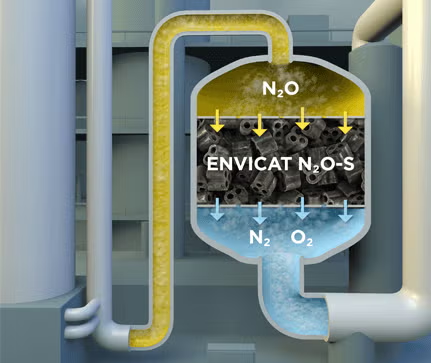Every year, more than 60 million tons of nitric acid, an essential feedstock for the fertilizer industry, are produced globally. Production of nitric acid emits nitrous oxide (N2O), a potent greenhouse gas that can remain in the atmosphere for more than 100 years and has a global warming impact that is approximately 300 times greater than carbon dioxide (CO2).
To address this challenge, specialty chemical manufacturer Clariant developed the EnviCat N2O-S catalyst, which can remove up to 95 percent of N2O generated in facilities as a byproduct of nitric acid production and convert it into nitrogen and oxygen.

The catalyst can also help increase nitric acid yield by improving the efficiency of the ammonia oxidation process. Designed as a “drop-in” solution for existing nitric acid production facilities, EnviCat N2O catalysts are currently installed in more than 45 plants globally. Combined, they have the potential to reduce annual N2O emissions equivalent to more than 20 million metric tons of CO2.
Yet today, more than half of the approximately 500 nitric acid plants operating globally run without N2O abatement—mostly in regions without emission control regulations.
To help further reduce the climate change impact of N2O, in November 2021, Clariant launched a global campaign to provide the EnviCat N2O-S catalyst free-of-charge to 10 nitric acid producers that do not currently have N2O off-gas treatment in place, particularly targeting facilities in developing countries in Africa, Asia, Central and South America. Clariant’s intent for this campaign is to help avoid GHG emissions equivalent to several million tons of CO2 each year.
In addition, Clariant is coordinating with the Germany-based Nitric Acid Climate Action Group to develop strategies to further reduce the climate impact of N2O emissions from nitric acid production.